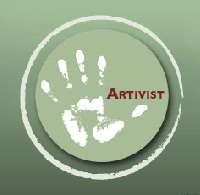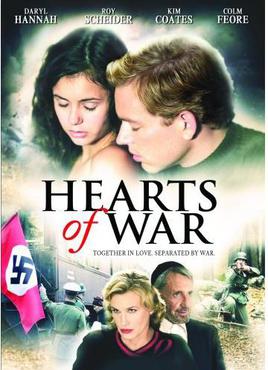
The Communist Party of Nepal (Maoist Centre) (Nepali: नेपाल कम्युनिस्ट पार्टी (माओवादी केन्द्र)), abbreviated CPN (Maoist Centre) or CPN (MC), is the third largest political party in Nepal and a member party of Samajbadi Morcha. It was founded in 1994 after breaking away from the Communist Party of Nepal (Unity Centre). The party launched an armed struggle in 1996 against the Nepalese government. In 2006, the party formally joined mainstream politics after signing a peace agreement following the 2006 Nepalese revolution.
Roman Kroitor was a Canadian filmmaker who was known as a pioneer of Cinéma vérité, as the co-founder of IMAX, and as the creator of the Sandde hand-drawn stereoscopic 3D animation system. He was also the original inspiration for The Force. His prodigious output garnered numerous awards, including two BAFTA Awards, three Cannes Film Festival awards, and two Oscar nominations.

The War Tapes is a 2006 American war documentary film directed by Deborah Scranton. The film is the first documentary account of the 2003 invasion of Iraq to be produced by the soldiers themselves. The film follows three New Hampshire Army National Guard soldiers before, during, and after their deployment to Iraq about a year after the invasion. Their unit was Charlie Company, 3rd Battalion, 172nd Infantry Regiment (Mountain), which deployed from March 2004 to February 2005.

Shake Hands with the Devil: The Journey of Roméo Dallaire is a 2004 Canadian documentary film about the 1994 genocide in Rwanda. It was directed by Peter Raymont and inspired by the book Shake Hands with the Devil: The Failure of Humanity in Rwanda (2003), by now-retired Canadian Lieutenant-General Roméo Dallaire. It was co-produced by the Canadian Broadcasting Corporation, the Société Radio-Canada, White Pine Pictures, and DOC: The Documentary Channel.

Raoul Peck is a Haitian filmmaker of both documentary and feature films. He is known for using historical, political, and personal characters to tackle and recount societal issues and historical events. Peck was Haiti's Minister of Culture from 1996 to September 1997. His film I Am Not Your Negro (2016), about the life of James Baldwin and race relations in the United States, was nominated for an Oscar in January 2017 and won a César Award in France. Peck's HBO documentary miniseries, Exterminate All the Brutes (2021), received a Peabody Award.

The Artivist Film Festival & Awards is an international film festival and awards ceremony dedicated to recognizing activist efforts of filmmakers, specifically in the areas of human rights, child advocacy, environmental preservation, and animal rights.

The Poet is a 2007 Canadian drama film starring Nina Dobrev, Colm Feore, Roy Scheider, Kim Coates and Daryl Hannah. It was written by Jack Crystal and directed by Damian Lee, with an estimated budget of CAD $11 million. It was released in the United States as Hearts of War.
The Comprehensive Peace Accord was signed on 21 November 2006 between the Government of Nepal and the Communist Party of Nepal —at the time known as the Communist Party of Nepal (Maoist).

Sushma Joshi is a Nepali writer, filmmaker based in Kathmandu, Nepal. Her fiction and non-fiction deal with Nepal's civil conflict, as well as stories of globalization, migration and diaspora.

Returned: Child Soldiers of Nepal's Maoist Army is a 2008 documentary film directed by American filmmaker Robert Koenig, and written by Robert Koenig and Brandon Kohrt. The documentary premiered in Hollywood, CA at Grauman's Egyptian Theatre in 2008 at the 5th Annual Artivist Film Festival, where it won the Artivist Award for Children's Advocacy. Returned also won the award for Best Documentary Short at the Atlanta Underground Film Festival that same year.

The incidence of child labour in Nepal is relatively high compared with other countries in South Asia. According to the Nepal Labour Force Survey in 2008, 86.2% of the children who were working were also studying, while 13.8% of the working children were not.

Sas Carey is an American film director, author, teacher, holistic nurse, and spiritual healer. She is best known for her four feature documentaries: Gobi Women's Song, Ceremony, Migration and Transition and her two books Reindeer Herders in My Heart: Stories of Healing Journeys in Mongolia, and Marrying Mongolia: A Memoir. She founded the non-profit Nomadicare, which works to support and preserve traditional Mongolian nomadic culture through healthcare, films and stories.

The Witness is a 2000 documentary film about animal rights directed by Jenny Stein. It was produced by James LaVeck. LaVeck and Stein's non-profit organization is Tribe of Heart.

Cysgod Rhyfel, also known as The Shadow of War, is a 2014 documentary film which explores the mental effects of conflict on former soldiers and their families. Predominantly in Welsh, the film was first broadcast on S4C on 18 May 2014. It was directed and produced by John Evans.
Eric Stover is an American human rights researcher and advocate and faculty director of the Human Rights Center at the University of California at Berkeley.

Julie Goldman is an American film producer and executive producer. She founded Motto Pictures in 2009. She is an Oscar-nominated and Emmy Award-winning producer and executive producer of documentary feature films and series.
Stanley Jackson (1914–1981) was a Canadian film director, producer, writer and narrator with the National Film Board of Canada (NFB).

The 2004 Beni attack was one of the biggest attacks by the People's Liberation Army (PLA) of Communist Party of Nepal, Maoist, during the Nepalese Civil War (1996–2006). Almost the entire Western Division of the PLA, numbering around 3,500, attacked government positions in Beni, the district headquarters of Myagdi district in western Nepal, on 20 March 2004 at around 10 pm. Hundreds of civilians were used for logistics. Around 90 soldiers of the PLA and dozens of police and military personnel as well as civilians died. Multiple government buildings were destroyed and dozens of members of the civil service and government forces were kidnapped by the PLA.















